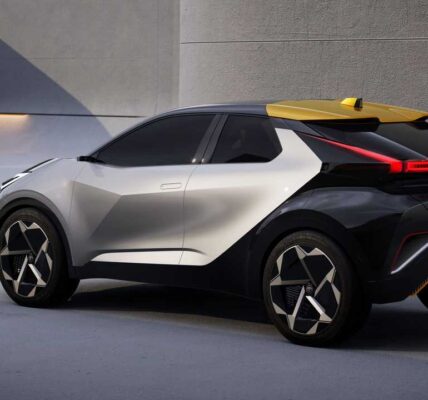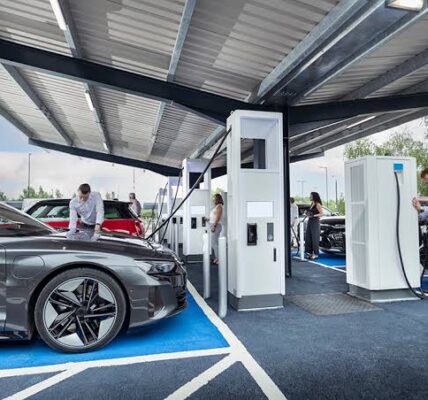Georgia sits at the center of a surge in electric vehicle manufacturing with billions in promised investments and tens of thousands of jobs set to turn the Peach State into one of the nation’s automotive hubs.
But in a weekend speech to the Georgia Republican Convention, former President Donald Trump took aim at the state’s fastest-growing industry.
“Now they want to give you all electric cars,” Trump, the GOP frontrunner in the 2024 presidential primary, said Saturday in Columbus. After hyperbolically knocking the charging times of EVs, Trump said: “First day in office, I’ll be ending all of that.”
Getting more Americans to choose EVs — which produce no tailpipe emissions once on the road — is key to Biden’s climate and economic agendas.
Though both of Georgia’s future EV assembly plants — one by Hyundai Motor Group and another by upstart Rivian — were announced before passage of the IRA, experts say companies committed billions to build factories in the U.S. in large part on federal tax credits and other subsidies already on the books or believed to be coming.
Few states have been bigger beneficiaries of the jobs and investment surge than Georgia with Hyundai’s plans for a $5.54 billion EV and battery plant near Savannah (8,100 jobs) and Rivian’s planned $5 billion factory an hour east of Atlanta (7,500 jobs). Since 2020, EV makers and their suppliers have announced more than 40 projects totaling more than 28,400 announced jobs and $22.7 billion in anticipated investment, according to Gov. Brian Kemp’s office.
“Anything which would discourage more EV development would not be economically good for Georgia,” Charles Bullock, a political science professor at the University of Georgia, told The Atlanta Journal-Constitution.
Kemp, who has been critical of Trump, has centered his economic development agenda around EVs, touting Georgia emergence as “the e-mobility capital of the nation.” Georgia and local officials also offered lucrative incentive packages, including $1.5 billion for Rivian and $1.8 billion for Hyundai.
Kemp also has been critical of the IRA, but has taken a more nuanced stance. Other GOP presidential contenders have taken shots at the climate bill, which passed the House and Senate without Republican support.
Before the IRA was signed, consumers buying EVs built by most companies qualified for federal tax credits of as much as $7,500. But once the law was signed last summer, EVs assembled overseas no longer qualified unless their manufacturing moved to the U.S.
Certain components and minerals used in EV batteries had to be sourced from North America rather than foreign rivals like China. The intent was to propel U.S. manufacturing.
The changes prompted heartburn among foreign automobile producers, such as Hyundai and Kia, since American competitors like Tesla would be able to offer discounted vehicles while foreign models lost their credits until their U.S. production could start. Kemp argued the new law punished companies like Hyundai that made new investments but were still building factories.
“We either need to do one of two things: You need to give them to everybody, or take them away, just make the playing field completely level,” Kemp said.
Hyundai and Rivian declined to comment. Cox Enterprises, which owns the AJC, holds about a 4% stake in Rivian.
The White House hailed the estimated $32 billion of new investments in Georgia since Biden took office, including $22 billion in EV and battery production and $10 billion for clean energy manufacturing facilities, according to the administration’s analysis. That’s among the most of any state in the country.
“In contrast to the false promises of the last administration, President Biden has delivered an historic manufacturing boom that is rebuilding our supply chains while surging jobs back from overseas,” White House Deputy Press Secretary Andrew Bates said.
Bullock said Trump disparaging EVs might play better to regions of the country with large oil and coal industries rather than Georgia, where EVs appear to have broader support.
A UGA poll in January conducted for the AJC showed nearly two-thirds of voters either “strongly” or “somewhat” support Georgia’s practice of using incentives to turn Georgia into an EV hub.
The supporters include about 80% of Democrats and roughly half of Republicans.
Both of Georgia’s U.S. senators, Democrats Jon Ossoff and Raphael Warnock, were critical votes in passing the IRA. Ossoff said it would be a mistake for Republicans to strip away those incentives if the GOP retakes the White House and Senate.
“It’s disappointing President Trump is joining Governor Kemp and Georgia’s GOP House members in supporting the repeal of manufacturing incentives that are benefiting Georgia more than just about any state in the nation,” an Ossoff spokesperson said.
Bullock added that automobile companies are basing their current plans around the IRA’s tax credit requirements, with some speeding up their timelines. Hyundai is on track to open its factory near Savannah months ahead of schedule, which state and company leaders partially credit to the rush to qualify for federal incentives.








